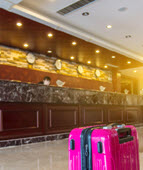Hotel Liability

When people stay at a hotel or resort, they expect that the premises will be kept in a reasonably safe condition. In fact, Florida law requires hotels to exercise special precautions to protect guests from injury. When hotel owners and staff violate these laws or negligently maintain their property and a guest is injured, they can be held accountable for resulting damages, including past and future medical expenses and lost wages.
Florida Law
In Florida, hotels and motels are required to ensure that their premises are kept reasonably safe, which includes:
- Keeping roofs, walls, ceilings, floors, stairs, windows, and fixtures clean and in good repair;
- Keeping attics, basements, and boiler rooms free of debris and flammable materials;
- Exterminating all insects, vermin, rodents, and termites;
- Keeping the premises properly drained and free of debris;
- Ensuring that every food handler or preparer has an up-to-date health certificate;
- Making sure that halls, stairways, and entrances are well-ventilated, clean, and free of obstructions and fire hazards;
- Keeping hall runners in good condition; and
- Installing guard rails around all porches and steps.
Public lodging establishments that fail to comply with these standards can be required to pay the medical expenses and lost wages of any injured guests.
Negligence
Aside from these statutory requirements, hotels must also meet the common law duty of care imposed upon them by the courts, which requires hotel owners and operators to protect guests from unreasonable dangers by:
- Warning of known dangerous conditions; and
- Regularly inspecting the premises for unknown hazards.
Unfortunately, despite these requirements, some hotels fail to take the steps necessary to create a safe and hazard-free environment. This in turn, can lead to serious accidents. One of the most common ways that hotel guests are injured is from slipping and falling. In these cases, injured parties can recover compensation if they can demonstrate that the hotel had actual or constructive notice of the condition that caused the plaintiff to trip or should have had notice of the condition, but did not take adequate measures to fix the hazard or warn others of its existence. For example, if a guest tripped and fell on torn or frayed carpet, the injured party may be able to collect damages if he or she can show that the carpet had not been inspected or replaced for a long period of time. If successful, the injured guest may be able to collect compensation for:
- Past and future medical expenses;
- Pain and suffering endured as a result of the injury;
- Lost wages;
- Loss of future income; and
- Property damage.
However, establishing a hotel’s negligence is notoriously difficult, so if you were injured while visiting a hotel, motel, or resort, it is critical to obtain the advice of an experienced personal injury attorney who can aggressively protect your interests.
Call Today to Speak With a Dedicated Florida Personal Injury Attorney
To speak with an experienced personal injury attorney about your own case, please contact Boone & Davis at 954-566-9919 today. Our Fort Lauderdale attorneys are prepared to help you with your case.
Resources:
fsulawrc.com/1963to70FAC/FlaAdminCode1963_45_175OCR.pdf
scholar.google.com/scholar_case?case=6222861000118660329&q=Fontana+v.+Wilson+World+Maingate+Condominium&hl=en&as_sdt=6,44
